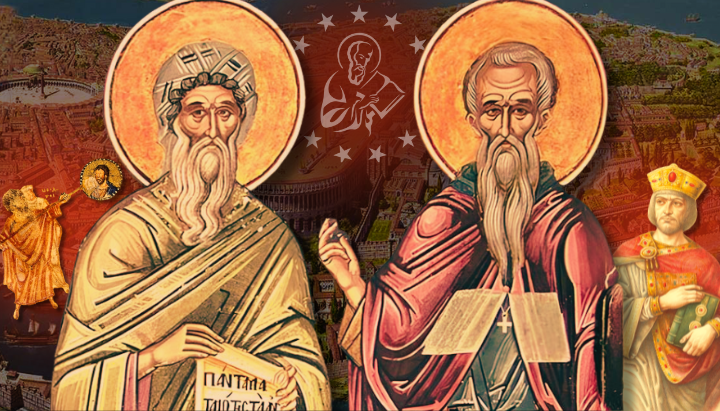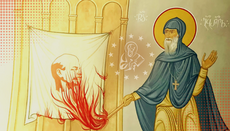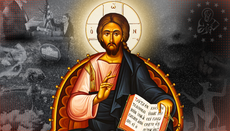St. Kosmas the Hymnographer: Poet, Bishop, and Defender of Icons

The bishop of Maiuma and adopted brother of St. John of Damascus is often forgotten in comparison to his legendary sibling but nevertheless contributed beautiful hymns to the Church and stood against Emperor Leo III during the period of iconoclasm.
“O Heavenly King, the Comforter, the Spirit of Truth, Who art everywhere present and fillest all things; Treasury of Blessings, and Giver of Life—come and abide in us, cleanse us from every stain, and save our souls, O Good One.”
Orthodox Christians typically hear or say this prayer every day, whether in a liturgical setting or in personal prayer. These prayers become our own, which is part of the beauty of Orthodox spirituality. Sometimes our prayer book will give the author's name. Sometimes, it won't. One of those that doesn’t is “O Heavenly King,” which is traditionally attributed to St. Kosmas the Hymnographer, an 8th century poet, bishop, and contemporary of St. John of Damascus.
Sometimes referred to as St. Kosmas the Hagiopolite (which translates to “of the Holy City”) due to his time spent as a monk in Jerusalem, St. Kosmas was orphaned at a young age and adopted by a man named Sergius, the father of St. John of Damascus. The two boys were raised and educated together by a well-educated monk, who was also named Kosmas, and whom Sergius freed from slavery for the specific purpose of teaching his children.
Learned in arts and sciences both secular and spiritual, the brothers went off to Jerusalem following the repose of Sergius and joined a monastery there. It is believed that they followed in the footsteps of their teacher, who had previously retired to the same monastery.
Around this same time, the heresy of iconoclasm had taken hold. Emperor Leo the Isaurian was the chief proponent of this error; St. John and St. Kosmas emerged as the great champions of the holy icons. Many are familiar with the story of St. John of Damascus: Emperor Leo forged a letter in St. John’s handwriting in which he suggested that Damascus be surrendered by the Islamic Caliphate to the Byzantine Empire. The Caliph (until then, John’s employer) then cut off the saint’s hand and threw him in prison, apparently silencing him from his work producing hymns and writings for the Church.
The OCA website picks up the story from there:
“That same evening, they returned the severed hand to St. John. The saint pressed it to his wrist and prayed to the Most Holy Theotokos to heal him so that he could defend the Orthodox Faith and write once again in praise of the Most Pure Virgin and Her Son. After a time, he fell asleep before the icon of the Mother of God. He heard Her voice telling him that he had been healed and commanding him to toil unceasingly with his restored hand. Upon awakening, he found that his hand had been attached to his arm once more. Only a small red mark around his wrist remained as a sign of the miracle.”
This miracle resulted in the writing of “All of Creation Rejoiceth in Thee” and St. John commissioned a silver model of his hand to be attached to an icon of the Theotokos, which is still known today as “Of the Three Hands.”
Lost in all of this is that, while St. John certainly endured more extreme persecution, St. Kosmas also defended the Church against the heresy of iconoclasm, writing hymns and living a strict life of prayer and fasting. In fact, St. Kosmas’ dedication to defending truth and serving the Church led to his ordination as a priest by the Patriarch of Antioch himself. Later, with much insistence from the Holy Synod, he was made Bishop of Maiuma, the port of ancient Gaza.
The bishop wrote commentaries on the poems of St. Gregory the Theologian. A poet himself, the Orthodox Church attributes fourteen canons to St. Kosmas. According to the Patriarchate of Antioch, these include the solemn canons for the Matins of Lazarus Saturday, Palm Sunday, the Triodes (canons with only three Canticles) that are chanted during Holy Week, the first canon of the Nativity (based on a Nativity sermon by St. Gregory the Theologian), and his most well-known works, the Canon for the Nativity of Christ and the Canon of the Cross. While St. John also composed canons for some of these feasts, it has never been reflected in Holy Tradition that the two were “friendly rivals.” Rather, they are described as dedicated hymnographers of the Church with a shared vision. It is even believed that they worked together on developing the Octoechos.
The refrain “More honorable than the Cherubim…” is also attributed to St. Kosmas, and was originally written for the 9th Ode of the Canon of Great and Holy Thursday before later being added into other hymns and services.
It can be debated whether all the hymns attributed to St. Kosmas were definitively written by him, considering his teacher had the same name. Regardless, he and St. John are two giants of the Church who are considered the best examples of later classical Greek hymnography.
St. Kosmas returned to the monastery in Jerusalem later in life and fell asleep in the Lord in the late 8th century after reaching old age. He was a year older than St. John, who some sources say reposed around the same time and others say reposed many years earlier. St. Kosmas is commemorated on October 12 in Slavic practice and October 14 in Greek practice.
The preface to St. John’s “The Fount of Knowledge,” his seminal work, which is often divided into three sections, begins with a dedication to his adopted brother:
“THE MOST LOWLY monk and priest John to the most saintly and honored of God, Father Kosmas the most holy Bishop of Maiuma, greetings in the Lord.”
St. Kosmas the Hymnographer, pray to God for us sinners!
Apolytikion
You are a guide of Orthodoxy, a teacher of piety and modesty, a luminary of the world, the God inspired pride of monastics. O wise Kosmas, you have enlightened everyone by your teachings. You are the harp of the Spirit. Intercede to Christ our God for the salvation of our souls.
Kontakion
Adorned with virtues, O blest Kosmas, and inspired of God, thou didst become a fair adornment of the Church of Christ, and with sacred songs, O Father, didst thou adorn her. Intercede thou with the Lord that He deliver us out of all the devices of the enemy, for we cry to thee: Rejoice, O thrice-blessed Father.









